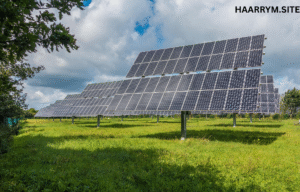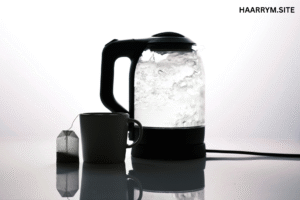The solar hot water heater has become a common choice in a society more and more focused on sustainable living and cutting energy consumption. By heating your home water from the sun, this environmentally beneficial solution lessens your need of gas or electricity. if your house is ecologically sensitive or you want to save money on utilities, knowing how a solar hot water heater operates—and if it would be appropriate for yours—is critical.
Everything from how solar water heaters operate, their benefits and drawbacks, varieties, installation advice, typical expenses, and long-term savings will be covered in this all-inclusive manual. We will also discuss government incentives and respond to often asked questions to enable you to decide with knowledge.
What Is a Solar Hot Water Heater?
Usually mounted on your roof, a solar hot water heater—also called a solar thermal system—collects heat from the sun and utilizes it to warm water using solar panels. After that, this hot water is kept in a tank ready for use in sinks, showers, dishwashers, and other domestic uses.
Solar thermal panels straight transform solar energy into heat, unlike photovoltaic solar panels that create electricity.
How Does a Solar Hot Water Heater Work?
Here’s a step-by-step overview of how the system operates:
-
Solar Collector Panels
These panels, often mounted on your roof, absorb the sun’s heat. There are two main types: flat-plate collectors and evacuated tube collectors. -
Heat Transfer System
The collected heat is transferred via a circulating fluid (either water or a water/antifreeze mix) through a closed-loop system or directly. -
Hot Water Storage Tank
The heat is transferred to your home’s water tank, storing the hot water until it’s needed. -
Backup Heating System
On cloudy days or when demand is high, an electric or gas booster ensures you never run out of hot water.
Types of Solar Hot Water Heaters
There are two primary types of solar water heating systems:
1. Active Solar Water Heaters
These systems use pumps and controllers to circulate water or heat-transfer fluid through the collectors.
-
Direct Circulation Systems: Ideal for warm climates. Water is pumped directly through the solar collectors and into the home.
-
Indirect Circulation Systems: Suitable for colder regions. They circulate a non-freezing heat-transfer fluid that heats the water via a heat exchanger.
2. Passive Solar Water Heaters
These systems don’t use pumps and are generally less expensive and more reliable but may not be as efficient.
-
Integral Collector Storage (ICS): These systems preheat water before it enters a conventional water heater.
-
Thermosyphon Systems: The tank is located above the collector, and natural convection circulates the water.
Benefits of a Solar Hot Water Heater
🌞 1. Significant Energy Savings
A solar water heater can reduce your water heating bills by 50% to 80%, depending on your location and usage.
🌱 2. Eco-Friendly Choice
Using renewable solar energy drastically reduces your carbon footprint, helping the planet while keeping your conscience clean.
🏡 3. Increase in Property Value
Eco-efficient homes are more desirable in today’s market. Installing a solar hot water system can boost your home’s resale value.
💰 4. Eligible for Government Incentives
Many countries offer tax credits, rebates, and incentives for solar water heating systems, lowering the upfront cost.
🔧 5. Low Maintenance
Once installed, these systems require minimal upkeep. Routine inspections every 3–5 years are typically enough.
Disadvantages to Consider
Although the pros often outweigh the cons, it’s important to consider the potential drawbacks:
-
High Initial Cost: Installation can range from $3,000 to $7,000, depending on system size and type.
-
Weather Dependency: Less effective on cloudy days or in areas with low solar irradiance.
-
Space Requirement: You’ll need adequate roof space for the collectors.
-
Maintenance of Components: Circulation pumps and heat exchangers may need occasional servicing.
Installation Tips for Solar Hot Water Heaters
✅ 1. Site Assessment
Ensure your roof gets adequate sun exposure (ideally south-facing in the Northern Hemisphere) with minimal shading.
✅ 2. Choose the Right System
Your climate, household size, and water usage habits influence whether you should choose active or passive systems.
✅ 3. Certified Installers
Always hire a certified, experienced professional to ensure compliance with local codes and optimal performance.
✅ 4. Permits and Inspections
Most regions require permits for solar installations. Your installer should help navigate these requirements.
✅ 5. Integration with Existing Systems
Solar water heaters can work alongside traditional water heaters. Hybrid systems offer backup heating for overcast days.
Costs and ROI (Return on Investment)
💸 Upfront Cost Breakdown:
| Component | Estimated Cost |
|---|---|
| Solar Collectors | $1,500 – $3,000 |
| Storage Tank | $1,000 – $2,000 |
| Installation | $1,000 – $2,000 |
| Total | $3,500 – $7,000 |
💵 Annual Savings:
-
Average household savings: $200–$500/year
-
Break-even point: 6–10 years, faster with government rebates or if electricity/gas prices rise.
Government Incentives and Tax Credits
Many governments offer incentives to promote renewable energy. For example:
-
United States: The Federal Solar Tax Credit (ITC) allows you to deduct up to 30% of the installation cost.
-
Australia: The STC (Small-scale Technology Certificate) program offers point-of-sale discounts.
-
UK: Eligible for the Renewable Heat Incentive (RHI) and local grants.
Check with your local energy department or installer for current programs in your area.
Solar Hot Water Heater vs Traditional Water Heaters
| Feature | Solar Hot Water Heater | Electric/Gas Water Heater |
|---|---|---|
| Energy Source | Sunlight | Electricity or gas |
| Operating Cost | Very low | Moderate to high |
| Eco-Friendliness | High | Low |
| Maintenance | Low | Moderate |
| Initial Cost | High | Low |
| Lifespan | 15–20 years | 8–12 years |
Clearly, while the upfront investment is higher, solar water heaters offer long-term savings and sustainability.
Frequently Asked Questions (FAQ)
❓ Is solar hot water worth it?
Yes, especially if you live in a sunny region. Over time, you’ll save hundreds to thousands in energy bills and contribute positively to the environment.
❓ How long do solar hot water heaters last?
Most systems last 15–20 years or more with proper maintenance. The storage tank may need replacement sooner.
❓ Can I install it myself?
DIY installation is not recommended unless you have plumbing and roofing experience. Professional installation ensures safety, warranty, and efficiency.
❓ Do solar water heaters work in winter?
Yes. Indirect circulation systems with antifreeze can operate effectively in cold weather. Backup heaters compensate for reduced solar gain.
❓ What size system do I need?
For a family of 4, a 300–400-liter system with 2–3 solar collectors is typically sufficient. A professional can assess your exact needs.
Real-Life Example: Homeowner Testimonial
“After switching to a solar hot water heater last year, our energy bills dropped by nearly 40%. I was skeptical at first, but it’s been one of the best upgrades we’ve made to our home. We feel good knowing we’re reducing our carbon footprint and saving money every month!”
— Lisa T., Melbourne, Australia
Final Thoughts: Should You Invest in a Solar Hot Water Heater?
A solar hot water heater is a smart, long-term fix for lowering your environmental impact and energy costs. Although the initial outlay might be large, the advantages—lower energy costs, more property value, and environmental friendliness—make the investment a worthy one.
See the solar potential of your house, look at local incentives, and speak with a qualified installer before committing. Your solar water heating system should pay for itself in a few years with the correct configuration.
Ready to Make the Switch?
Take the first step today. Contact a local solar energy expert, explore financing options, and take advantage of government rebates. Your future self—and the planet—will thank you

